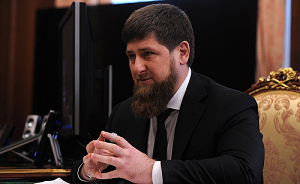Attacks in Chechnya Suggest Opposition to Kadyrov is Far from Eradicated
By Emil Souleimanov
March 24, 2017, the CACI Analyst
At the turn of 2016 and 2017, events took place in parts of Chechnya that again challenged the triumphant statements of local pro-Moscow and federal authorities that the jihadist-inspired insurgency in this North Caucasian republic was eradicated. Aside from illustrating the latent character of armed conflict in the region in general and in Chechnya in particular, the recent upsurge of violence in Chechnya contains particularities that may have far-reaching consequences. Sporadic attacks against the Kadyrov regime will likely recur in the years to come and intensify should the regime’s grip on power weaken. 
Will Russia deploy Chechen units to Syria?
By Emil Souleimanov
November 9th, 2015, The CACI Analyst
Chechnya’s Ramzan Kadyrov has recently expressed readiness to deploy Chechen militia to Syria as part of a Russian ground force to support President Bashar al-Assad. Russian authorities have from the outset of Russia’s military engagement in the Middle East virtually ruled out the possibility of deploying ground forces, confining their engagement to air power. Yet, according to some observers, it could under certain circumstances become necessary for Moscow to also deploy ground troops. The deployment of Chechen troops to Syria is therefore a prospect to consider in the months to come.
Existing Paradigms for Resistance in the North Caucasus Challenged by Kadyrov, ISIS
By Kevin Daniel Leahy (06/24/2015 issue of the CACI Analyst)
With the recent death of its leader and the decisions by numerous field commanders in Dagestan and Chechnya to disassociate themselves with the organization, analysts are wondering if the Caucasus Emirate can endure. The terrorist group calling itself the Islamic State (ISIS) has emerged as the latest paradigm for resistance to Russian rule in the Caucasus. It is, however, only the latest in a long line of such paradigms to take root in the region, competing with the Caucasus Emirate, Chechen nationalism and other forms of ethnic separatism. What is the outlook for ISIS as a paradigm for resistance in the North Caucasus?

Moscow Steps Up Pressure on Chechnya's Powerful Ruler
By Valeriy Dzutsev (05/27/2015 issue of the CACI Analyst)
Chechnya’s ruler Ramzan Kadyrov has unexpectedly clashed with Moscow. The Russian government appears increasingly uneasy with Kadyrov’s unquestionable authority in Chechnya. At the same time, while Kadyrov will not easily yield to pressure from Moscow easily, he is evidently the weaker side in this battle. Only if Russia experiences a breakdown of power and its own strongman Vladimir Putin steps down, the Chechen leader will outlive his enemies in Moscow. Acutely aware of Russia’s projected economic downturn and its dampening effect on state capacity, Russian elites may force a regime change in Chechnya to avoid the risk of dealing with a strong regional leader at a time of decline in Moscow’s power.







